Comprehensive Analysis of Evidence-Based Practice in Nursing: A Report
VerifiedAdded on 2022/09/24
|8
|1683
|19
Report
AI Summary
This report provides an analysis of evidence-based practice (EBP) in nursing, highlighting its importance in improving clinical practice by applying scientifically proven findings to advance service delivery. The report addresses the role of EBP in nursing decision-making, communication, and accountability. It also discusses the importance of respecting patient values and preferences, and the limitations hindering the implementation of EBP, such as lack of support and resources. The report then examines a randomized controlled trial on the use of music therapy for depression, analyzing its strengths and weaknesses. The findings suggest music therapy's effectiveness, leading to a recommendation for its use in treating depression. The report concludes with suggestions on how to overcome barriers to EBP implementation, emphasizing the need for sufficient time, managerial support, knowledge provision, and organizational resources to sustain the practice.
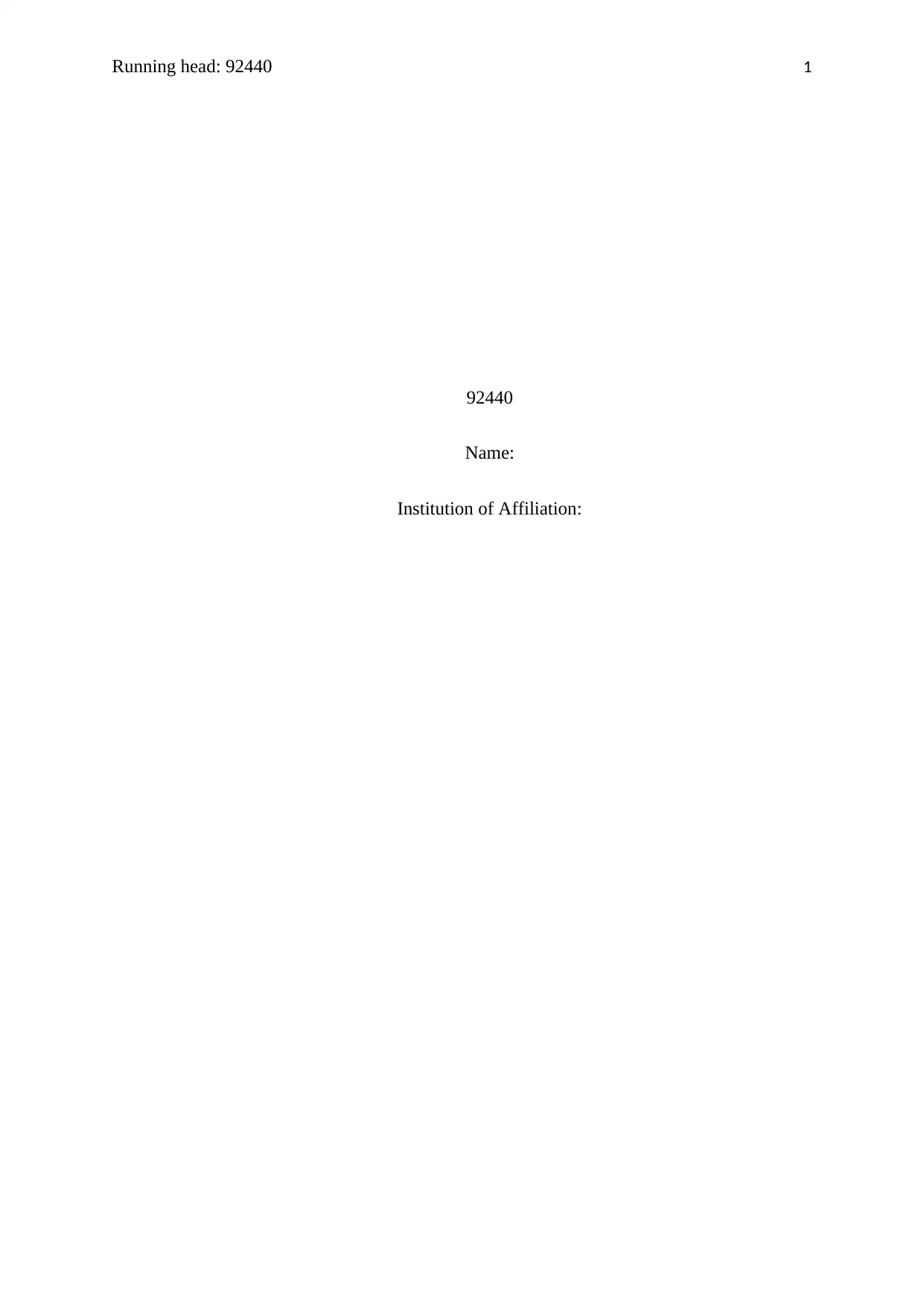
Running head: 92440 1
92440
Name:
Institution of Affiliation:
92440
Name:
Institution of Affiliation:
Paraphrase This Document
Need a fresh take? Get an instant paraphrase of this document with our AI Paraphraser
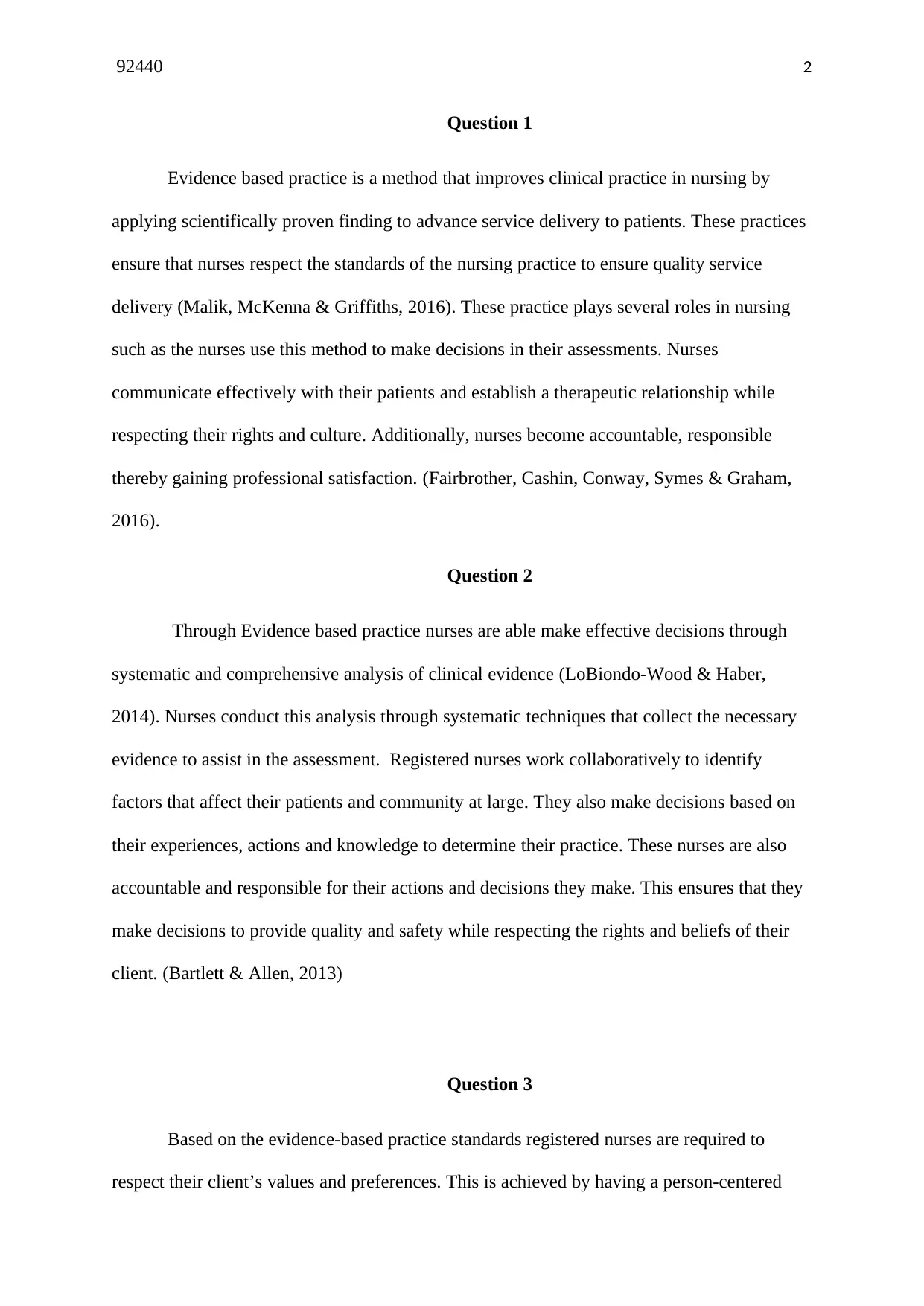
92440 2
Question 1
Evidence based practice is a method that improves clinical practice in nursing by
applying scientifically proven finding to advance service delivery to patients. These practices
ensure that nurses respect the standards of the nursing practice to ensure quality service
delivery (Malik, McKenna & Griffiths, 2016). These practice plays several roles in nursing
such as the nurses use this method to make decisions in their assessments. Nurses
communicate effectively with their patients and establish a therapeutic relationship while
respecting their rights and culture. Additionally, nurses become accountable, responsible
thereby gaining professional satisfaction. (Fairbrother, Cashin, Conway, Symes & Graham,
2016).
Question 2
Through Evidence based practice nurses are able make effective decisions through
systematic and comprehensive analysis of clinical evidence (LoBiondo-Wood & Haber,
2014). Nurses conduct this analysis through systematic techniques that collect the necessary
evidence to assist in the assessment. Registered nurses work collaboratively to identify
factors that affect their patients and community at large. They also make decisions based on
their experiences, actions and knowledge to determine their practice. These nurses are also
accountable and responsible for their actions and decisions they make. This ensures that they
make decisions to provide quality and safety while respecting the rights and beliefs of their
client. (Bartlett & Allen, 2013)
Question 3
Based on the evidence-based practice standards registered nurses are required to
respect their client’s values and preferences. This is achieved by having a person-centered
Question 1
Evidence based practice is a method that improves clinical practice in nursing by
applying scientifically proven finding to advance service delivery to patients. These practices
ensure that nurses respect the standards of the nursing practice to ensure quality service
delivery (Malik, McKenna & Griffiths, 2016). These practice plays several roles in nursing
such as the nurses use this method to make decisions in their assessments. Nurses
communicate effectively with their patients and establish a therapeutic relationship while
respecting their rights and culture. Additionally, nurses become accountable, responsible
thereby gaining professional satisfaction. (Fairbrother, Cashin, Conway, Symes & Graham,
2016).
Question 2
Through Evidence based practice nurses are able make effective decisions through
systematic and comprehensive analysis of clinical evidence (LoBiondo-Wood & Haber,
2014). Nurses conduct this analysis through systematic techniques that collect the necessary
evidence to assist in the assessment. Registered nurses work collaboratively to identify
factors that affect their patients and community at large. They also make decisions based on
their experiences, actions and knowledge to determine their practice. These nurses are also
accountable and responsible for their actions and decisions they make. This ensures that they
make decisions to provide quality and safety while respecting the rights and beliefs of their
client. (Bartlett & Allen, 2013)
Question 3
Based on the evidence-based practice standards registered nurses are required to
respect their client’s values and preferences. This is achieved by having a person-centered
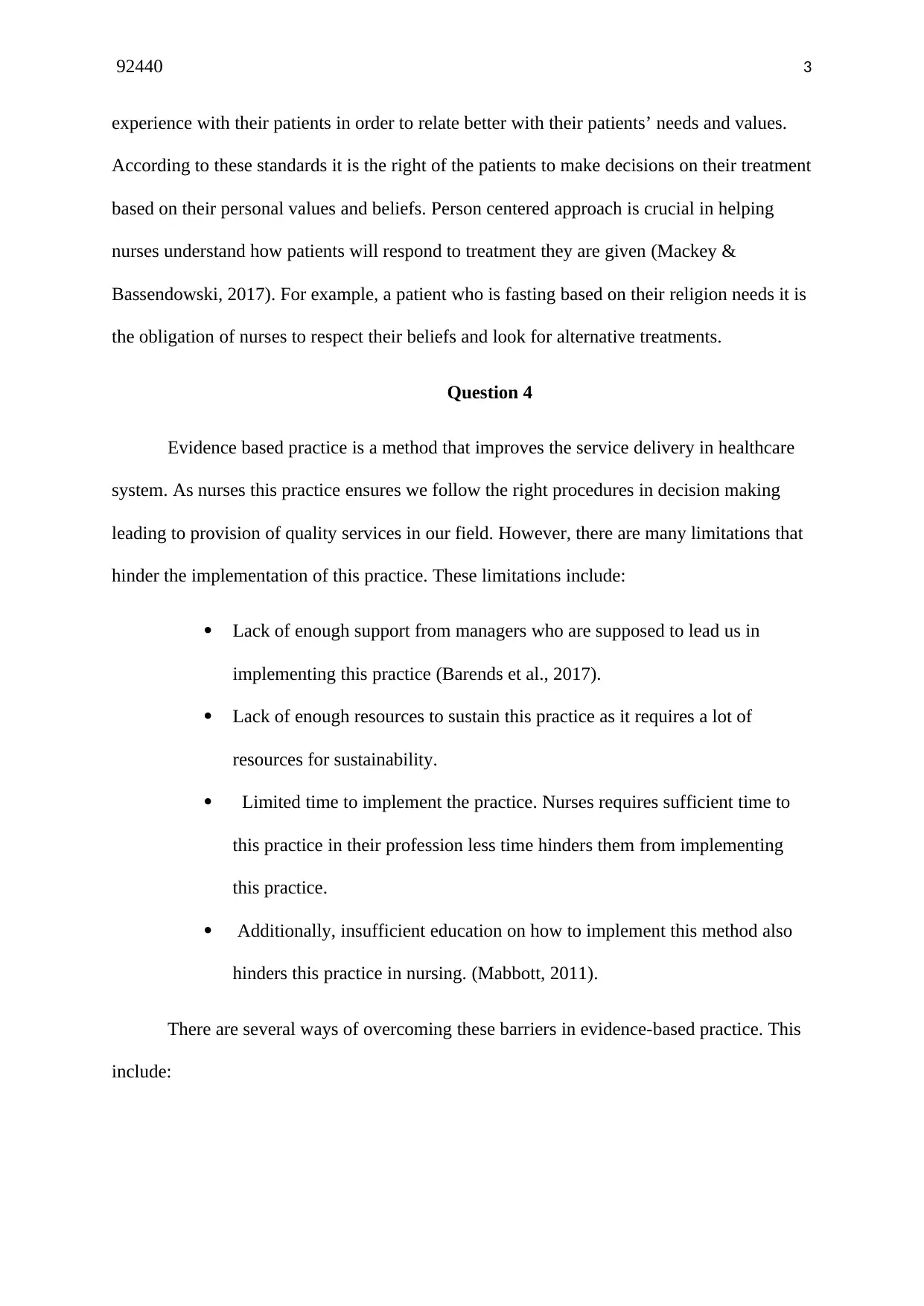
92440 3
experience with their patients in order to relate better with their patients’ needs and values.
According to these standards it is the right of the patients to make decisions on their treatment
based on their personal values and beliefs. Person centered approach is crucial in helping
nurses understand how patients will respond to treatment they are given (Mackey &
Bassendowski, 2017). For example, a patient who is fasting based on their religion needs it is
the obligation of nurses to respect their beliefs and look for alternative treatments.
Question 4
Evidence based practice is a method that improves the service delivery in healthcare
system. As nurses this practice ensures we follow the right procedures in decision making
leading to provision of quality services in our field. However, there are many limitations that
hinder the implementation of this practice. These limitations include:
Lack of enough support from managers who are supposed to lead us in
implementing this practice (Barends et al., 2017).
Lack of enough resources to sustain this practice as it requires a lot of
resources for sustainability.
Limited time to implement the practice. Nurses requires sufficient time to
this practice in their profession less time hinders them from implementing
this practice.
Additionally, insufficient education on how to implement this method also
hinders this practice in nursing. (Mabbott, 2011).
There are several ways of overcoming these barriers in evidence-based practice. This
include:
experience with their patients in order to relate better with their patients’ needs and values.
According to these standards it is the right of the patients to make decisions on their treatment
based on their personal values and beliefs. Person centered approach is crucial in helping
nurses understand how patients will respond to treatment they are given (Mackey &
Bassendowski, 2017). For example, a patient who is fasting based on their religion needs it is
the obligation of nurses to respect their beliefs and look for alternative treatments.
Question 4
Evidence based practice is a method that improves the service delivery in healthcare
system. As nurses this practice ensures we follow the right procedures in decision making
leading to provision of quality services in our field. However, there are many limitations that
hinder the implementation of this practice. These limitations include:
Lack of enough support from managers who are supposed to lead us in
implementing this practice (Barends et al., 2017).
Lack of enough resources to sustain this practice as it requires a lot of
resources for sustainability.
Limited time to implement the practice. Nurses requires sufficient time to
this practice in their profession less time hinders them from implementing
this practice.
Additionally, insufficient education on how to implement this method also
hinders this practice in nursing. (Mabbott, 2011).
There are several ways of overcoming these barriers in evidence-based practice. This
include:
⊘ This is a preview!⊘
Do you want full access?
Subscribe today to unlock all pages.

Trusted by 1+ million students worldwide
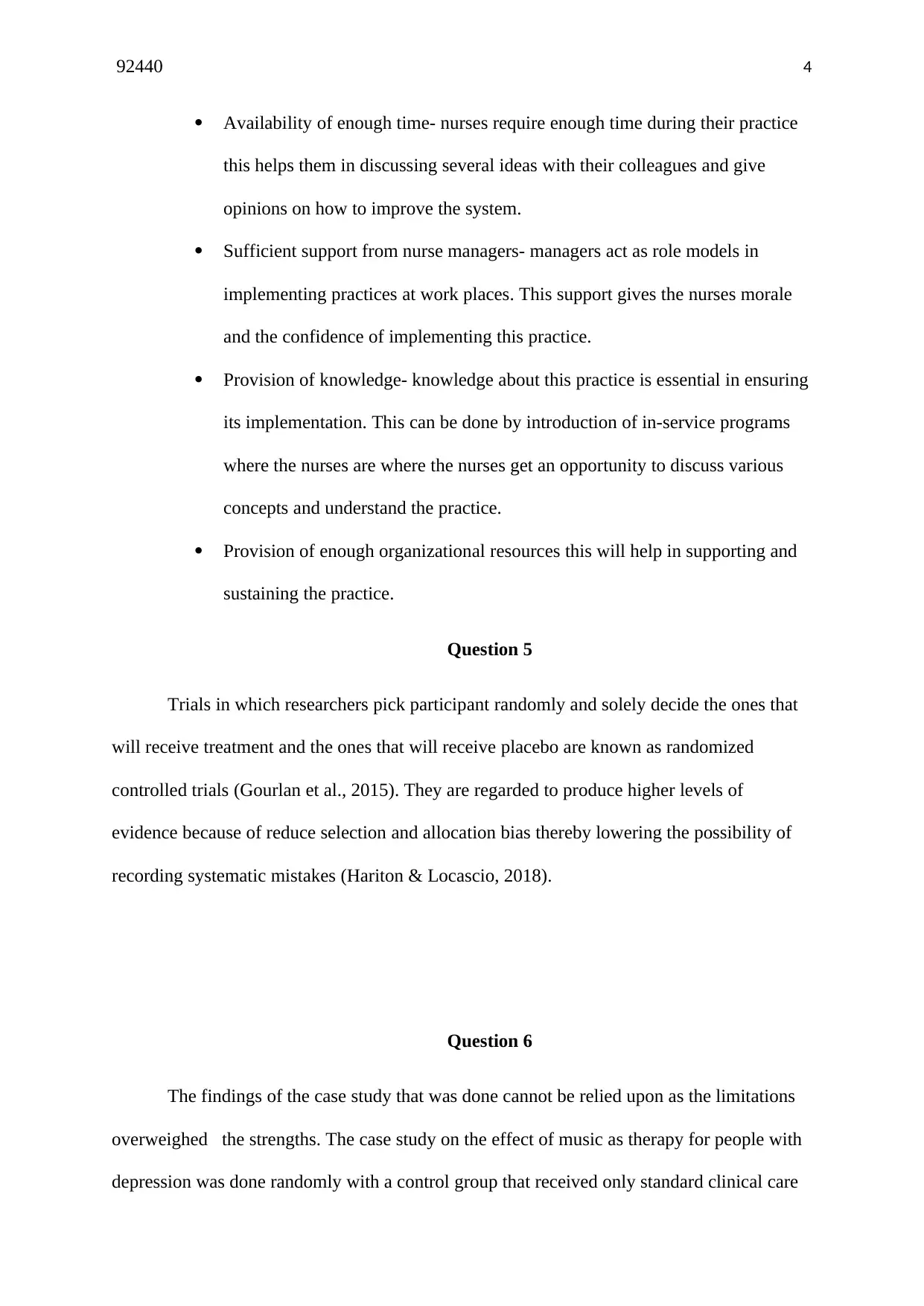
92440 4
Availability of enough time- nurses require enough time during their practice
this helps them in discussing several ideas with their colleagues and give
opinions on how to improve the system.
Sufficient support from nurse managers- managers act as role models in
implementing practices at work places. This support gives the nurses morale
and the confidence of implementing this practice.
Provision of knowledge- knowledge about this practice is essential in ensuring
its implementation. This can be done by introduction of in-service programs
where the nurses are where the nurses get an opportunity to discuss various
concepts and understand the practice.
Provision of enough organizational resources this will help in supporting and
sustaining the practice.
Question 5
Trials in which researchers pick participant randomly and solely decide the ones that
will receive treatment and the ones that will receive placebo are known as randomized
controlled trials (Gourlan et al., 2015). They are regarded to produce higher levels of
evidence because of reduce selection and allocation bias thereby lowering the possibility of
recording systematic mistakes (Hariton & Locascio, 2018).
Question 6
The findings of the case study that was done cannot be relied upon as the limitations
overweighed the strengths. The case study on the effect of music as therapy for people with
depression was done randomly with a control group that received only standard clinical care
Availability of enough time- nurses require enough time during their practice
this helps them in discussing several ideas with their colleagues and give
opinions on how to improve the system.
Sufficient support from nurse managers- managers act as role models in
implementing practices at work places. This support gives the nurses morale
and the confidence of implementing this practice.
Provision of knowledge- knowledge about this practice is essential in ensuring
its implementation. This can be done by introduction of in-service programs
where the nurses are where the nurses get an opportunity to discuss various
concepts and understand the practice.
Provision of enough organizational resources this will help in supporting and
sustaining the practice.
Question 5
Trials in which researchers pick participant randomly and solely decide the ones that
will receive treatment and the ones that will receive placebo are known as randomized
controlled trials (Gourlan et al., 2015). They are regarded to produce higher levels of
evidence because of reduce selection and allocation bias thereby lowering the possibility of
recording systematic mistakes (Hariton & Locascio, 2018).
Question 6
The findings of the case study that was done cannot be relied upon as the limitations
overweighed the strengths. The case study on the effect of music as therapy for people with
depression was done randomly with a control group that received only standard clinical care
Paraphrase This Document
Need a fresh take? Get an instant paraphrase of this document with our AI Paraphraser
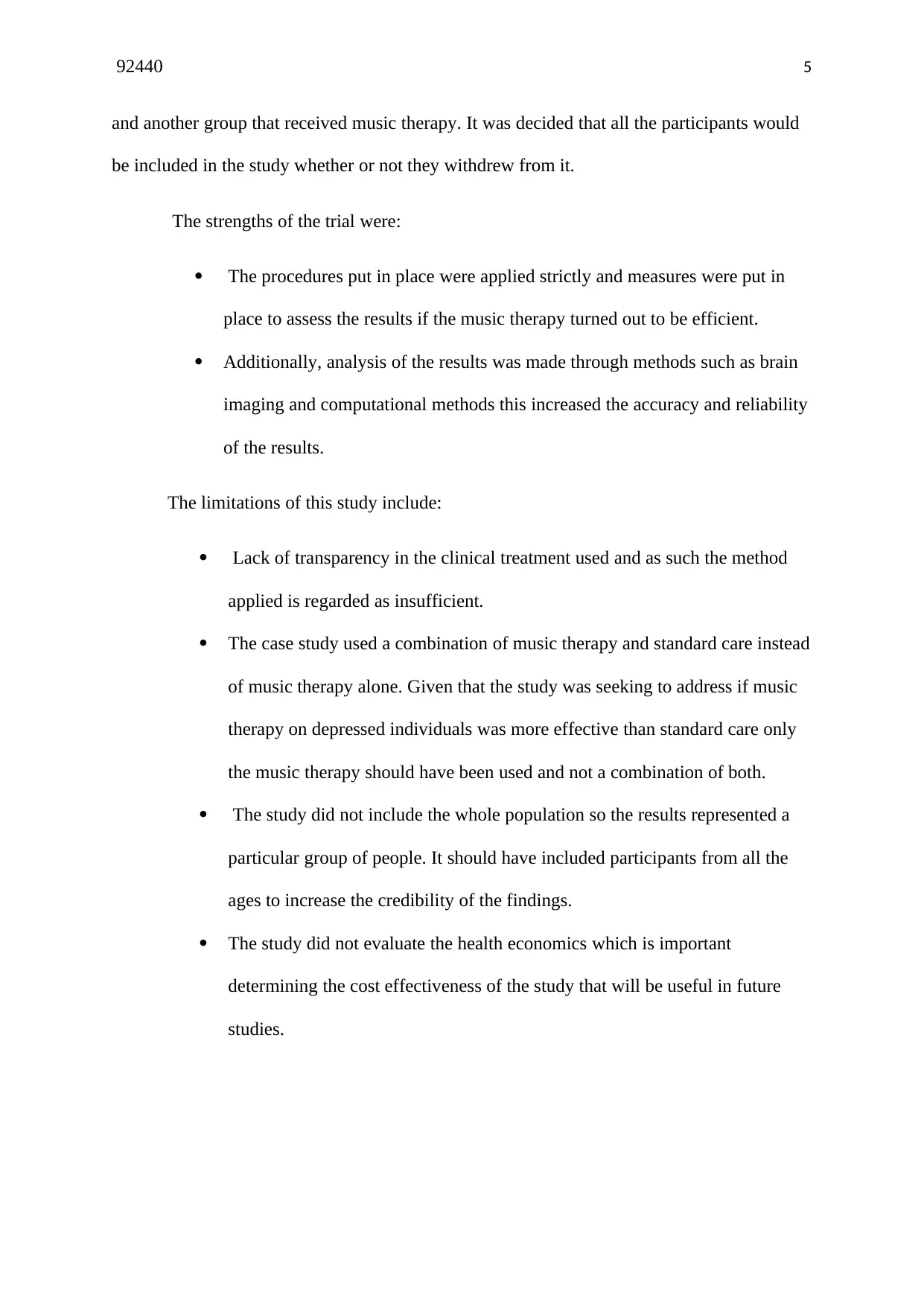
92440 5
and another group that received music therapy. It was decided that all the participants would
be included in the study whether or not they withdrew from it.
The strengths of the trial were:
The procedures put in place were applied strictly and measures were put in
place to assess the results if the music therapy turned out to be efficient.
Additionally, analysis of the results was made through methods such as brain
imaging and computational methods this increased the accuracy and reliability
of the results.
The limitations of this study include:
Lack of transparency in the clinical treatment used and as such the method
applied is regarded as insufficient.
The case study used a combination of music therapy and standard care instead
of music therapy alone. Given that the study was seeking to address if music
therapy on depressed individuals was more effective than standard care only
the music therapy should have been used and not a combination of both.
The study did not include the whole population so the results represented a
particular group of people. It should have included participants from all the
ages to increase the credibility of the findings.
The study did not evaluate the health economics which is important
determining the cost effectiveness of the study that will be useful in future
studies.
and another group that received music therapy. It was decided that all the participants would
be included in the study whether or not they withdrew from it.
The strengths of the trial were:
The procedures put in place were applied strictly and measures were put in
place to assess the results if the music therapy turned out to be efficient.
Additionally, analysis of the results was made through methods such as brain
imaging and computational methods this increased the accuracy and reliability
of the results.
The limitations of this study include:
Lack of transparency in the clinical treatment used and as such the method
applied is regarded as insufficient.
The case study used a combination of music therapy and standard care instead
of music therapy alone. Given that the study was seeking to address if music
therapy on depressed individuals was more effective than standard care only
the music therapy should have been used and not a combination of both.
The study did not include the whole population so the results represented a
particular group of people. It should have included participants from all the
ages to increase the credibility of the findings.
The study did not evaluate the health economics which is important
determining the cost effectiveness of the study that will be useful in future
studies.
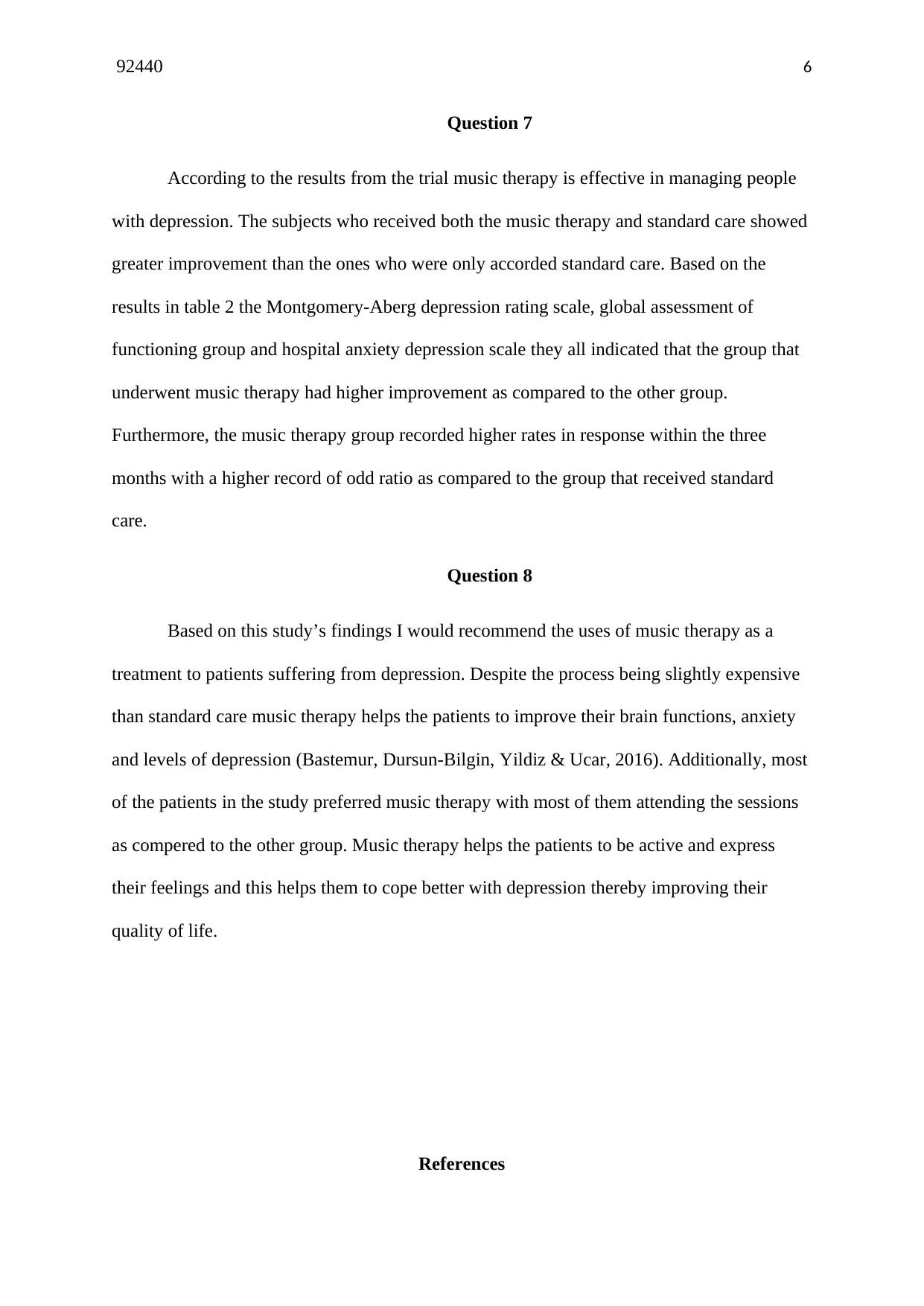
92440 6
Question 7
According to the results from the trial music therapy is effective in managing people
with depression. The subjects who received both the music therapy and standard care showed
greater improvement than the ones who were only accorded standard care. Based on the
results in table 2 the Montgomery-Aberg depression rating scale, global assessment of
functioning group and hospital anxiety depression scale they all indicated that the group that
underwent music therapy had higher improvement as compared to the other group.
Furthermore, the music therapy group recorded higher rates in response within the three
months with a higher record of odd ratio as compared to the group that received standard
care.
Question 8
Based on this study’s findings I would recommend the uses of music therapy as a
treatment to patients suffering from depression. Despite the process being slightly expensive
than standard care music therapy helps the patients to improve their brain functions, anxiety
and levels of depression (Bastemur, Dursun-Bilgin, Yildiz & Ucar, 2016). Additionally, most
of the patients in the study preferred music therapy with most of them attending the sessions
as compered to the other group. Music therapy helps the patients to be active and express
their feelings and this helps them to cope better with depression thereby improving their
quality of life.
References
Question 7
According to the results from the trial music therapy is effective in managing people
with depression. The subjects who received both the music therapy and standard care showed
greater improvement than the ones who were only accorded standard care. Based on the
results in table 2 the Montgomery-Aberg depression rating scale, global assessment of
functioning group and hospital anxiety depression scale they all indicated that the group that
underwent music therapy had higher improvement as compared to the other group.
Furthermore, the music therapy group recorded higher rates in response within the three
months with a higher record of odd ratio as compared to the group that received standard
care.
Question 8
Based on this study’s findings I would recommend the uses of music therapy as a
treatment to patients suffering from depression. Despite the process being slightly expensive
than standard care music therapy helps the patients to improve their brain functions, anxiety
and levels of depression (Bastemur, Dursun-Bilgin, Yildiz & Ucar, 2016). Additionally, most
of the patients in the study preferred music therapy with most of them attending the sessions
as compered to the other group. Music therapy helps the patients to be active and express
their feelings and this helps them to cope better with depression thereby improving their
quality of life.
References
⊘ This is a preview!⊘
Do you want full access?
Subscribe today to unlock all pages.

Trusted by 1+ million students worldwide
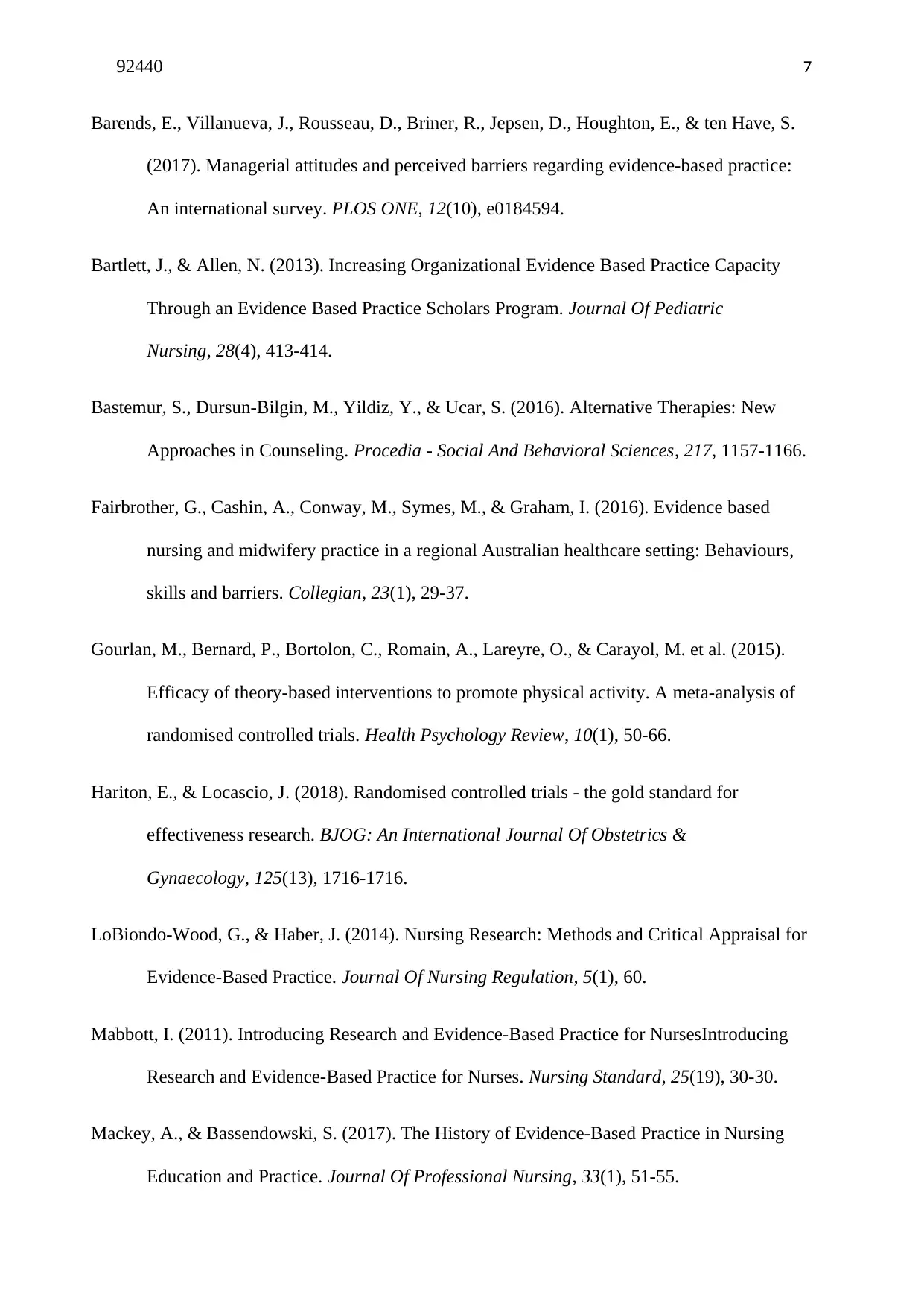
92440 7
Barends, E., Villanueva, J., Rousseau, D., Briner, R., Jepsen, D., Houghton, E., & ten Have, S.
(2017). Managerial attitudes and perceived barriers regarding evidence-based practice:
An international survey. PLOS ONE, 12(10), e0184594.
Bartlett, J., & Allen, N. (2013). Increasing Organizational Evidence Based Practice Capacity
Through an Evidence Based Practice Scholars Program. Journal Of Pediatric
Nursing, 28(4), 413-414.
Bastemur, S., Dursun-Bilgin, M., Yildiz, Y., & Ucar, S. (2016). Alternative Therapies: New
Approaches in Counseling. Procedia - Social And Behavioral Sciences, 217, 1157-1166.
Fairbrother, G., Cashin, A., Conway, M., Symes, M., & Graham, I. (2016). Evidence based
nursing and midwifery practice in a regional Australian healthcare setting: Behaviours,
skills and barriers. Collegian, 23(1), 29-37.
Gourlan, M., Bernard, P., Bortolon, C., Romain, A., Lareyre, O., & Carayol, M. et al. (2015).
Efficacy of theory-based interventions to promote physical activity. A meta-analysis of
randomised controlled trials. Health Psychology Review, 10(1), 50-66.
Hariton, E., & Locascio, J. (2018). Randomised controlled trials - the gold standard for
effectiveness research. BJOG: An International Journal Of Obstetrics &
Gynaecology, 125(13), 1716-1716.
LoBiondo-Wood, G., & Haber, J. (2014). Nursing Research: Methods and Critical Appraisal for
Evidence-Based Practice. Journal Of Nursing Regulation, 5(1), 60.
Mabbott, I. (2011). Introducing Research and Evidence-Based Practice for NursesIntroducing
Research and Evidence-Based Practice for Nurses. Nursing Standard, 25(19), 30-30.
Mackey, A., & Bassendowski, S. (2017). The History of Evidence-Based Practice in Nursing
Education and Practice. Journal Of Professional Nursing, 33(1), 51-55.
Barends, E., Villanueva, J., Rousseau, D., Briner, R., Jepsen, D., Houghton, E., & ten Have, S.
(2017). Managerial attitudes and perceived barriers regarding evidence-based practice:
An international survey. PLOS ONE, 12(10), e0184594.
Bartlett, J., & Allen, N. (2013). Increasing Organizational Evidence Based Practice Capacity
Through an Evidence Based Practice Scholars Program. Journal Of Pediatric
Nursing, 28(4), 413-414.
Bastemur, S., Dursun-Bilgin, M., Yildiz, Y., & Ucar, S. (2016). Alternative Therapies: New
Approaches in Counseling. Procedia - Social And Behavioral Sciences, 217, 1157-1166.
Fairbrother, G., Cashin, A., Conway, M., Symes, M., & Graham, I. (2016). Evidence based
nursing and midwifery practice in a regional Australian healthcare setting: Behaviours,
skills and barriers. Collegian, 23(1), 29-37.
Gourlan, M., Bernard, P., Bortolon, C., Romain, A., Lareyre, O., & Carayol, M. et al. (2015).
Efficacy of theory-based interventions to promote physical activity. A meta-analysis of
randomised controlled trials. Health Psychology Review, 10(1), 50-66.
Hariton, E., & Locascio, J. (2018). Randomised controlled trials - the gold standard for
effectiveness research. BJOG: An International Journal Of Obstetrics &
Gynaecology, 125(13), 1716-1716.
LoBiondo-Wood, G., & Haber, J. (2014). Nursing Research: Methods and Critical Appraisal for
Evidence-Based Practice. Journal Of Nursing Regulation, 5(1), 60.
Mabbott, I. (2011). Introducing Research and Evidence-Based Practice for NursesIntroducing
Research and Evidence-Based Practice for Nurses. Nursing Standard, 25(19), 30-30.
Mackey, A., & Bassendowski, S. (2017). The History of Evidence-Based Practice in Nursing
Education and Practice. Journal Of Professional Nursing, 33(1), 51-55.
Paraphrase This Document
Need a fresh take? Get an instant paraphrase of this document with our AI Paraphraser
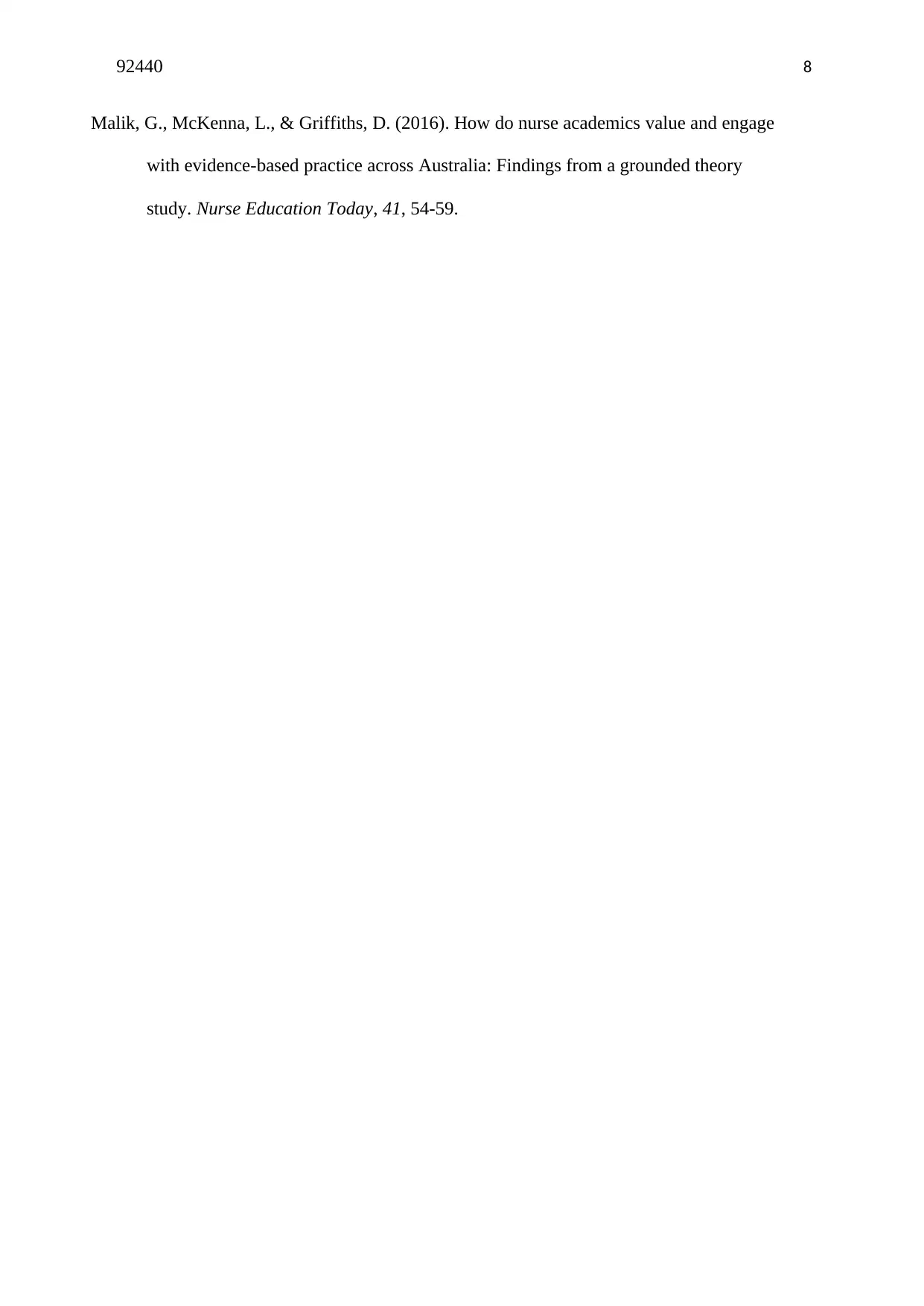
92440 8
Malik, G., McKenna, L., & Griffiths, D. (2016). How do nurse academics value and engage
with evidence-based practice across Australia: Findings from a grounded theory
study. Nurse Education Today, 41, 54-59.
Malik, G., McKenna, L., & Griffiths, D. (2016). How do nurse academics value and engage
with evidence-based practice across Australia: Findings from a grounded theory
study. Nurse Education Today, 41, 54-59.
1 out of 8
Related Documents
Your All-in-One AI-Powered Toolkit for Academic Success.
+13062052269
info@desklib.com
Available 24*7 on WhatsApp / Email
![[object Object]](/_next/static/media/star-bottom.7253800d.svg)
Unlock your academic potential
Copyright © 2020–2026 A2Z Services. All Rights Reserved. Developed and managed by ZUCOL.





